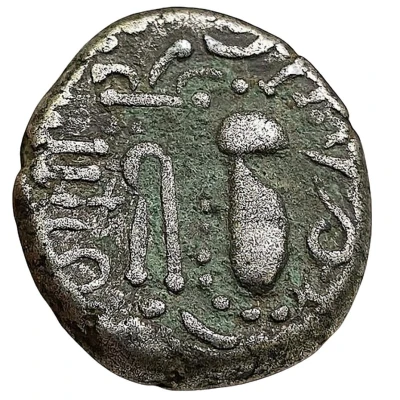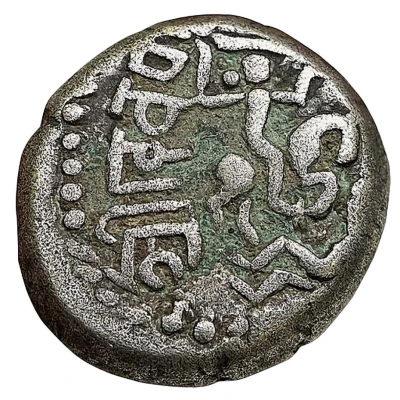


© Virasat Auctions
Gadhaiya Paisa - Devapala Gadhaiya Paramaras of Malwa ND
| Billon | 4.3 g | 13.53 mm |
| Issuer | Gadhaiya (Indian Northern Dynasties) |
|---|---|
| Type | Circulating commemorative coin |
| Years | 1218-1239 |
| Value | 1 Drachm |
| Currency | Drachm (543-1390) |
| Composition | Billon |
| Weight | 4.3 g |
| Diameter | 13.53 mm |
| Shape | Round (irregular) |
| Technique | Hammered |
| Orientation | Variable alignment ↺ |
| Demonetized | Yes |
| Updated | 2024-10-05 |
| Numista | N#374939 |
|---|---|
| Rarity index | 100% |
Reverse
Scene of battle field with the victor mounted on horse and marching to right, holding sword up with both hands symbolizing victory, A warrior lying seated on the ground in front, All within a dotted border, Nagari legend in left field reading ‘ShriDevap (la)’
Edge
Plain
Comment
Catalog reference: Deyell # Lakshmi, Bearer of riches, pg. 144 plate specimen,extremely rare & Unique coin
this coin & the 3 below recently came up in an auction - the lot seem to form a complete battle story depicting the various stages of war right from marching towards the battle field, an active day time war scene, a night scene and finally the show of victory (this coin)
till now, attribution for the Battle scene Gadhaiya coins was unclear, the two tentative contenders were Paramars of Malwa or Silharas of Konkan
with this coin surfacing, the debate perhaps will end with a clear attribution of the Battle series to Devapala (Paramara dynasty)
Wikipedia - https://en.wikipedia.org/wiki/Devapala_(Paramara_dynasty)
Interesting fact
One interesting fact about the Gadhaiya Paisa - Devapala Gadhaiya coin is that it features a unique blend of Indian and Islamic influences in its design. The coin's obverse side features a depiction of Lord Shiva, a prominent Hindu deity, while the reverse side features an inscription in Persian, which was the language of the Islamic rulers of the time. This blending of cultural influences reflects the diverse and multicultural nature of the Indian subcontinent during the medieval period.